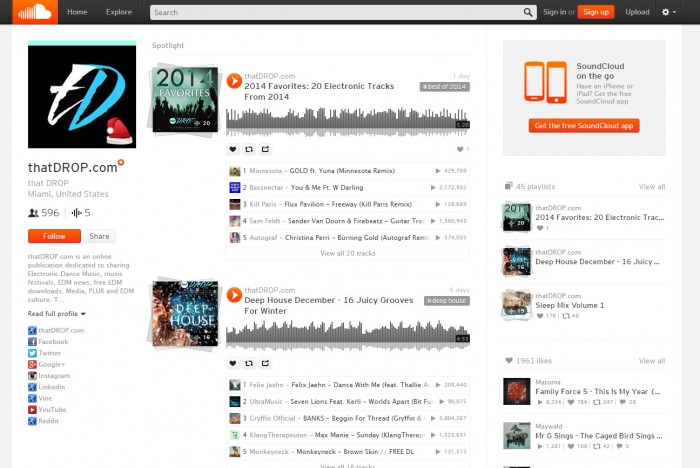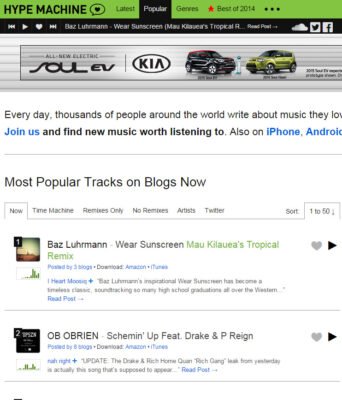Last week, SoundCloud raised $150 million in funding from unidentified investors.

This investment is in addition to the $60 million received from Institutional Venture Partners (“IVP”) and the Chernin Group earlier this year.
In connection to the latter investment, IVP issued a blog post titled “Why SoundCloud Will Rule the Digital Audio World,” where they claimed SoundCloud will be the “YouTube of Audio.”
Because YouTube has since entered into the music streaming market, this notion assumes that IVP meant that SoundCloud will be the most popular streaming service for average listeners.
The unidentified investors haven’t made a public statement regarding their motives behind investing in SoundCloud but it is likely they want the platform to be the service that trumps all streaming options. However, SoundCloud should continue to tailor its service to independent musicians instead of modifying it to accommodate the average listener.
All major standalone streaming services (Spotify, Rdio, Slacker, Etc.) have strong basic functional streaming features which make it so that the listener remains in the platform environment. On these services users can easily search through catalogs of artists and discover new music.
While SoundCloud already possesses many of these features, the majority of content on the platform is accessed through a number of blogs and other third-party websites. Additionally, the service structure has allowed for new musicians to upload their content to share to their already established audiences.
For example, an artist will link their SoundCloud page through social media profile. Although it is possible to discover the artist on SoundCloud, many users will agree that they don’t use the service primarily to discover artists.

Few standalone streaming features hasn’t deterred SoundCloud’s 175 million unique monthly listeners.
 Users consume music differently from casual listeners using stand-alone services. Often times users aren’t streaming from SoundCloud’s native user interface. Instead these users listen to content that is embedded in blog posts or on players built from SoundCloud’s application programming interface (API). HypeMachine curates SoundCloud content from blogs in a Reddit-like fashion from the sites’ own users. The site then uses its own player built from SoundCloud’s API to stream the songs.
Users consume music differently from casual listeners using stand-alone services. Often times users aren’t streaming from SoundCloud’s native user interface. Instead these users listen to content that is embedded in blog posts or on players built from SoundCloud’s application programming interface (API). HypeMachine curates SoundCloud content from blogs in a Reddit-like fashion from the sites’ own users. The site then uses its own player built from SoundCloud’s API to stream the songs.
SoundCloud has amassed a tremendous amount of lesser known musicians because there is essentially no barrier to get on the platform. Many talented unknown musicians favor the ability to quickly publish promotional music without having to deal with digital distribution agreements that most other services require.
As a result, the world’s most popular music streaming service allows listeners to embrace musicians’ latest creations with little commercial interference.
The lack of the one-stop-streaming elements is part of what makes SoundCloud favored among users.
Musician Ryan Hemsworth created a SoundCloud page called Secret Songs, dedicated to sharing music he discovered, most of which from musicians utilizing the music sharing service. Hemsworth wrote:
[Secret Songs is] an outlet I can use to share music I love and believe in directly with people who want to discover something new. It’s about two things: inclusion and discovery. For those curious but who might not have the connections to find the weirder, lesser known artists. I want it to give people the feeling I get when a producer emails me a zip of 20 unreleased songs they’ve made this month that are all amazing.
Secret Songs currently has over 25,000 followers.
Instead of moving toward a standalone model geared toward the average listener, SoundCloud (and its investors) should strive to implement a monetization strategy that will cultivate their existing user base.
It has been reported that SoundCloud is planning to implement a subscription-based model for listeners.
It is unclear how a subscription model will affect the musicians who share music on the platform.
SoundCloud should continue to be mindful of the unique space in the streaming landscape so that users can continue to enjoy the “weirder, lesser known artists” without inhibition.
This guest column was contributed by Mike Spinelli
Mike is a third-year law student at Quinnipiac University School of law, where he is studying music transactions and music licensing. He previously worked at SoundExchange. Contact Mike at mespinelli@quinnipiac.edu.

